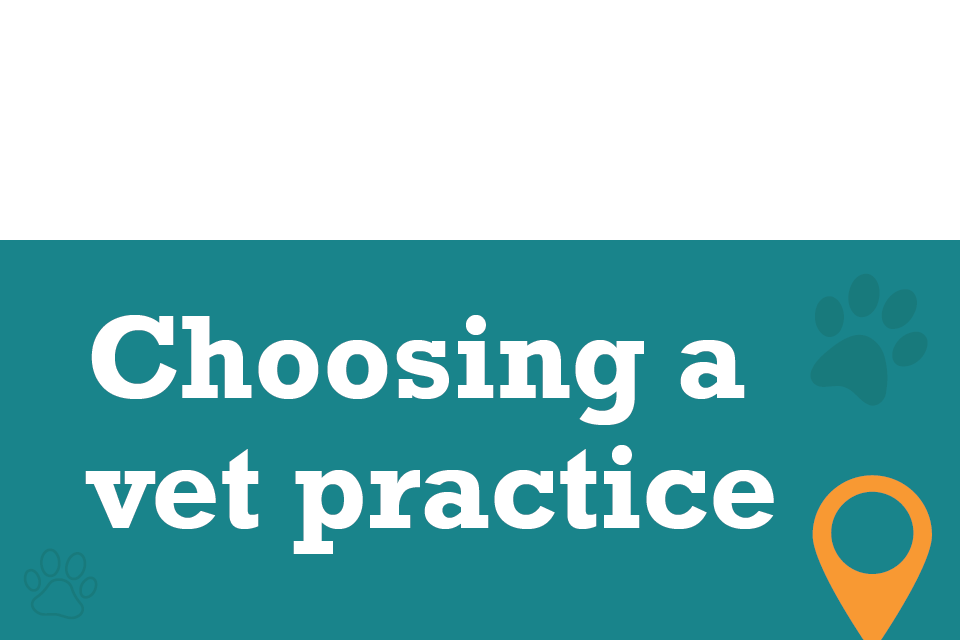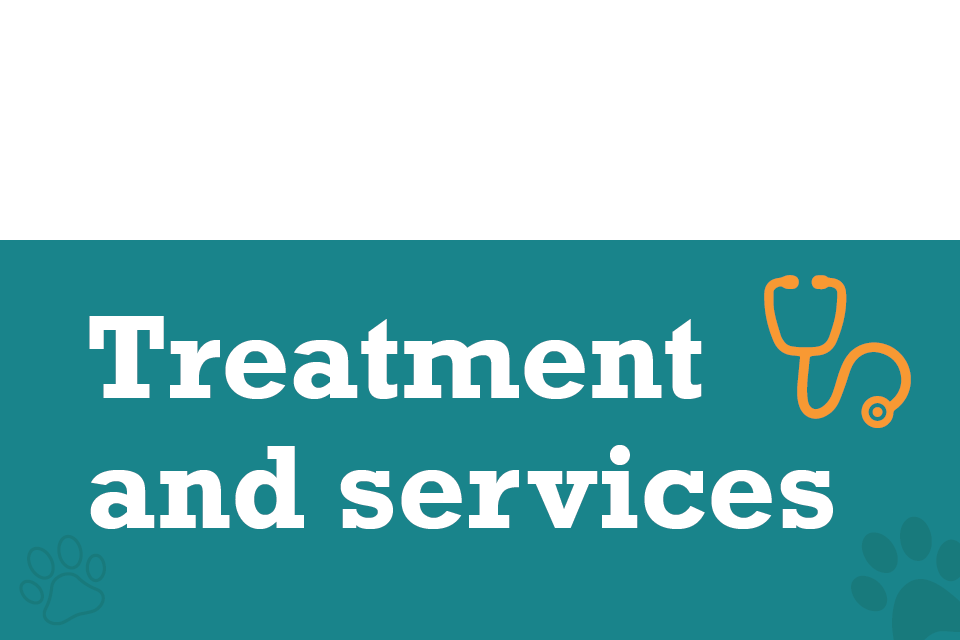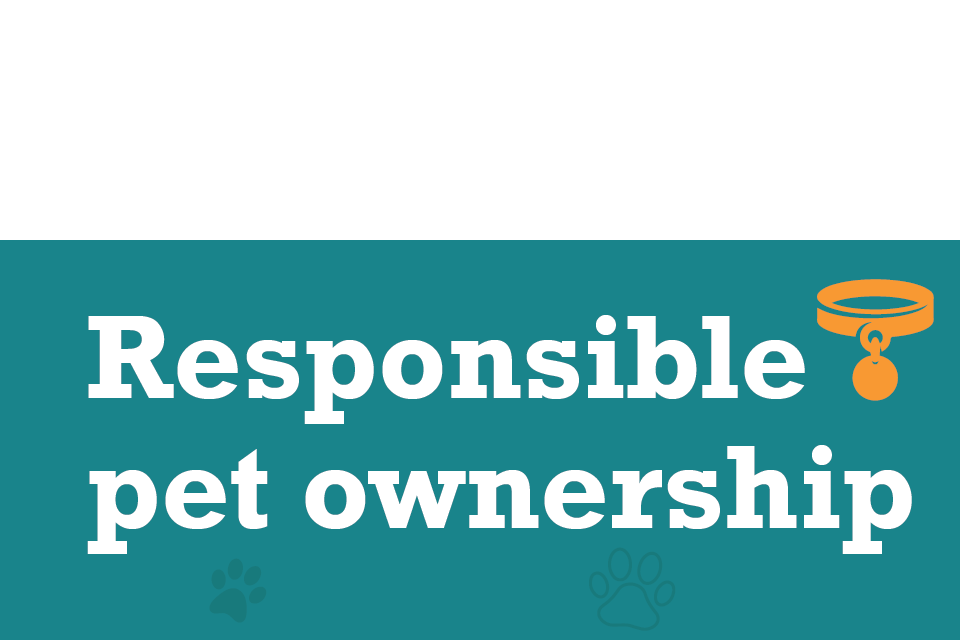Choosing a vet practice and treatments for your pet
Updated 25 September 2024

Introduction
Pet owners are responsible for making all sorts of choices about the care their pets receive.
As part of that care, you decide which vet practice to use and what treatments to buy, with advice from your vet.
It’s important those decisions are right for you and your pet.
Having the right information, and knowing what questions to ask can help when making decisions, including:
- choosing a vet practice
- deciding what treatments to buy (including referrals for tests, treatment or surgery)
- buying prescription medication (medicines that a vet has prescribed or told you to use)

Choosing a vet practice
Look further than the closest vet
When looking for a vet practice, research shows that pet owners are more likely to find a practice that:
- is near to their home
- they can easily travel to
- people have recommended
There are other things that you may want to think about when choosing a vet practice.
You can find a veterinary practice using the Royal College of Veterinary Surgeons’ find a vet database.
Pricing
Different vet practices can often charge different prices for the same treatment and services. It’s worth comparing prices across different practices.
Prices are often available on the vet practice’s website, or you can ask them for a pricelist directly.
Check prices for some of the most common treatments and services that pets are likely to need, like:
- consultations
- prescriptions
- annual vaccinations
- first vaccinations for puppies or kittens
- microchipping
- neutering or spaying a dog or cat
Some vet practices might offer payment plans, which allow for the cost of vet care to be spread across a number of payments.
If you think a payment plan would help you, check if the vet practice offers them.
The vet practice must be registered by the Financial Conduct Authority to extend credit.
Check if the practice is independent or part of a chain
Vet practices can be independently owned or part of a large veterinary group.
To find out who owns a vet practice, check their website or ask them directly.
Look at the practice’s size, facilities and services
Vet practices can be different sizes, have different numbers of staff, and can vary in the treatment and services they offer.
For example, you might prefer to travel further to a practice that has more on-site facilities, more staff or longer opening hours.
Vet practices should offer an out-of-hours service. If this is important to you, check who provides it. Some practices provide it themselves and others use a third-party business. If the practice uses a third party, check how near that other business is to where you live.

Treatment and services
Ask if there are other treatment options
Vets provide expert advice when your pet is unwell or injured. It’s important they understand any queries or concerns you have when they’re advising you.
If you are unclear or concerned about any recommended treatment or the cost of treatment, then it’s important to discuss this with your vet.
You can ask your vet why they’ve recommended the treatment, and if there are any alternatives. If you have concerns about cost, discuss this with the vet practice. There may be alternative options (for example, providing the treatment in stages, to spread the cost).
Check:
-
if it’s possible to ask for alternative providers that are cheaper, or in a better location for you, if your pet needs to be referred to a specialist for surgery or tests
-
how urgent the treatment is, so you know if you or your vet can explore other options
-
what the likely outcome may be for your pet and how much the treatment will cost (most of the time this will be an estimate and not a fixed price) - do this before you proceed with any treatment
-
whether further treatment might be necessary
It’s important to you and your vet that you understand why a treatment has been recommended. Considering the costs and asking if there are any other options does not mean you do not care for your pet or trust your vet.

Prescription medication
Consider buying medication elsewhere
It may be convenient to purchase prescription medication directly from your vet practice, and in some emergency you might not have a choice.
Pet owners do not always have to buy medication from their vet practice.
Vet practices can provide a prescription for the medication, which allows you to buy it elsewhere (like from an online medication supplier).
There’s usually a fee for a prescription if you are not buying the medication directly from the vet, but even including this fee, it’s sometimes still cheaper to buy the medication elsewhere.
Find accredited online suppliers on the Veterinary Medicines Directorate pages.
If you don’t know what the fee is for a prescription at your vet practice, ask.
You should also ask the vet whether you will need repeat prescriptions, or further consultations to review the medication.
Prescription fees are not fixed and so vet practices can charge different amounts. Depending on the time between prescriptions, or the kind of medicine being prescribed, your pet may need a further examination.

Being a responsible pet owner
Owning a pet comes with responsibilities which are important to keeping them happy and healthy.
If you’re thinking of getting a new pet, take some time to choose an animal that suits your lifestyle and previous experience of looking after a pet. Think about things like how much space you’ll need (including for activities), and the impact on any family members or pets already in the home.
Different breeds have distinct health profiles, with some being more prone to certain conditions. For example, some breeds may be more likely to develop joint issues, respiratory problems, or other inherited conditions. It’s important to be aware of these risks and potential costs.
Consider your budget for taking care of a pet, including food costs, routine vet care and the possibility of vet care in the case of injury or illness.
Find helpful resources to support your decision at BVA - Choosing a pet and the Pet Advertising Advisory Group.
Pet insurance
It’s important to plan how you would cover vet costs if your pet were to encounter illness or injury. Consider getting pet insurance which can help manage unexpected vet bills.
Review different insurance policies to find one that suits your needs. Not all policies cost the same or offer the same amount of cover so check the terms before you take out a policy.
Policies vary in the amount you can claim for each condition, and in the duration of the cover they provide. Some policies offer lifetime cover, while others offer cover for a set period such as 12 months. Some policies cover treatment for illness, while others cover accidental injuries. Most policies do not cover routine care such as vaccinations or neutering.
Consider if you can afford to pay monthly insurance premiums, or cover emergency vet bills if required.
Fore more information about pet insurance and how to understand the type of cover you might want to purchase, read PDSA’s pet insurance guide or visit the MoneyHelper pet insurance page.

